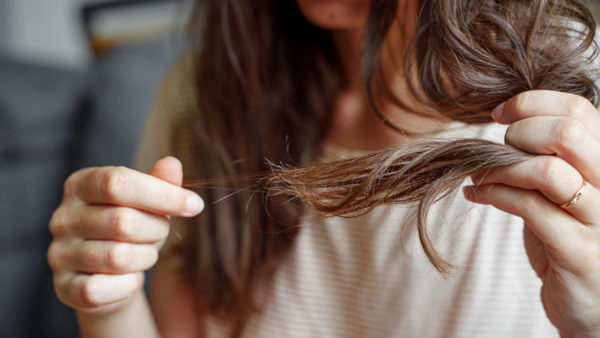Do you find long strands of hair on your pillowcase and hair brush often? Believe it or not, stress is the second biggest cause of hair loss after genetics. Stress affects the skin, including the scalp, through inflammatory responses, leading to hair loss conditions. Stress and anxiety can lead to hair loss through several conditions, including telogen effluvium, trichotillomania, and alopecia areata.Here’s what it means:
Telogen Effluvium
Telogen effluvium is a common cause of temporary hair loss. Stress can push hair follicles into a resting phase, halting new hair growth. This condition can lead to noticeable hair shedding during activities like washing, combing, or touching the hair. Other triggers include poor nutrition, severe infections, major surgery, hormone changes, and certain medications. There are two types: acute (lasting fewer than six months) and chronic (lasting longer than six months). Symptoms include increased hair loss without symptoms like rash or itching.
Trichotillomania
Trichotillomania, or hair-pulling disorder, occurs when stress or tension causes individuals to pull out their hair. Classified as an obsessive-compulsive disorder, it involves pulling hair from the scalp, face, and other body parts. The causes are not completely understood, but genetics, brain structure changes, and extreme stress may contribute. Trichotillomania can be managed with medication and therapy. Diagnostic criteria include bald spots, significant distress, and unsuccessful efforts to stop hair pulling.
Alopecia Areata
Alopecia areata is an autoimmune disease leading to sudden hair loss on the scalp, face, or other body areas. The immune system attacks hair follicles, causing hair to fall out. Hair may regrow and fall out repeatedly. Though the exact cause is unclear, genetics may play a role. The condition’s severity varies, and emotional stress or illness can trigger it in predisposed individuals. Symptoms include sudden hair loss forming bald patches, brittle nails, and sensations like itching or burning. It can also cause eye irritation if eyelashes or eyebrows are lost.
Thankfully, stress-induced hair loss is usually temporary. Trauma-induced hair loss is usually temporary, and it tends to return once stress levels are reduced. Seeking professional advice can help address the issue.
Simple remedies to stop and prevent hair loss

1. Meditation and Breathwork: Practicing breathing exercises and meditation can reduce stress. Apps like Headspace and Calm offer guided sessions.
2. Positive Environment: Creating a pleasant workspace can benefit mental health. Adding personal touches and different textures can improve mood.
3. Scalp Stimulation: Scalp massages using hair oil can boost blood flow and stimulate hair follicles.
4. Tension Release: Muscle tensing exercises can help the body recognize and release tension, replacing anxiety responses with relaxation.
5. Balanced Diet: Ensuring adequate intake of iron, Vitamin D, and zinc is essential for healthy hair. Supplements like Viviscal’s Hair Growth Programme can aid in hair growth.
6. Platelet Rich Plasma (PRP) Treatment: PRP therapy involves injecting concentrated platelets into the scalp to promote hair growth.
7. Low-Level Light Treatment: Using light at a specific frequency can stimulate protein production in the scalp, strengthening hair.
8. Positive Activities: Incorporating enjoyable activities into daily routines can help manage stress.
Addressing stress and taking proactive measures can help manage hair loss during these challenging times.
6 early warning signs of stroke that you should not ignore


